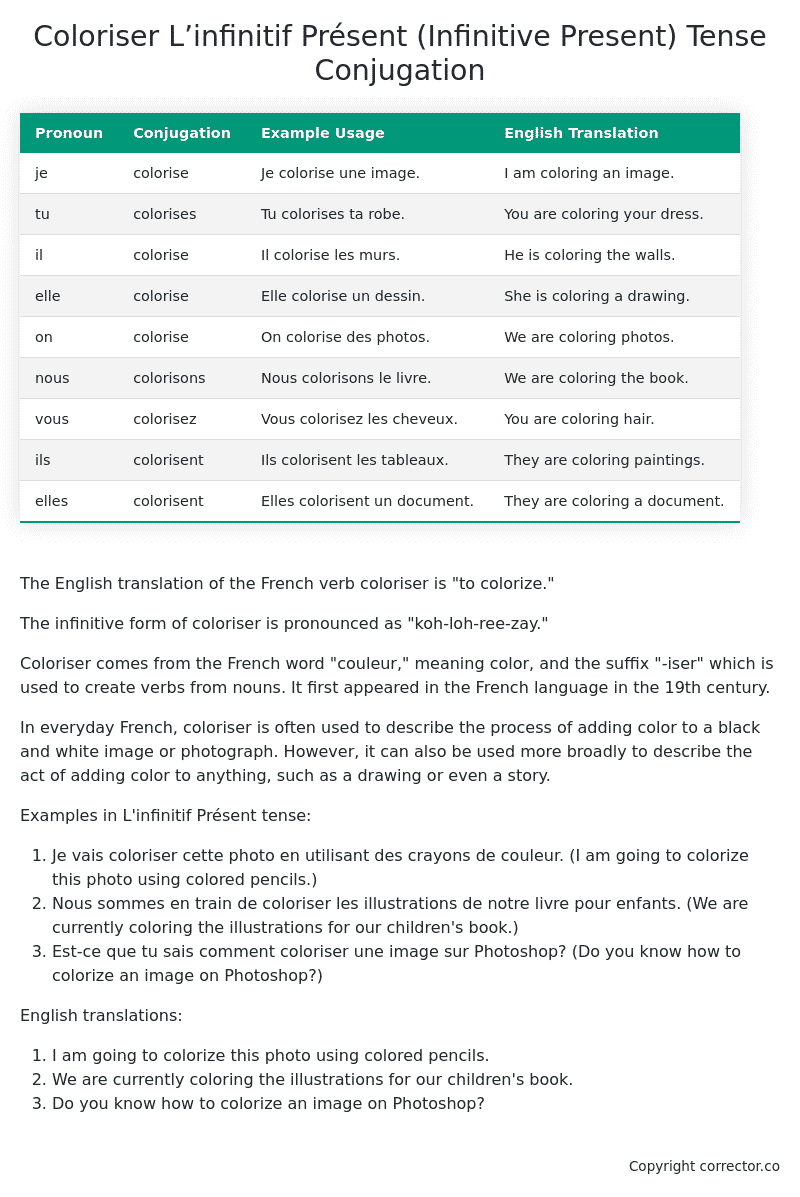L’infinitif Présent (Infinitive Present) Tense Conjugation of the French Verb coloriser
Introduction to the verb coloriser
The English translation of the French verb coloriser is “to colorize.”
The infinitive form of coloriser is pronounced as “koh-loh-ree-zay.”
Coloriser comes from the French word “couleur,” meaning color, and the suffix “-iser” which is used to create verbs from nouns. It first appeared in the French language in the 19th century.
In everyday French, coloriser is often used to describe the process of adding color to a black and white image or photograph. However, it can also be used more broadly to describe the act of adding color to anything, such as a drawing or even a story.
Examples in L’infinitif Présent tense:
- Je vais coloriser cette photo en utilisant des crayons de couleur. (I am going to colorize this photo using colored pencils.)
- Nous sommes en train de coloriser les illustrations de notre livre pour enfants. (We are currently coloring the illustrations for our children’s book.)
- Est-ce que tu sais comment coloriser une image sur Photoshop? (Do you know how to colorize an image on Photoshop?)
English translations:
- I am going to colorize this photo using colored pencils.
- We are currently coloring the illustrations for our children’s book.
- Do you know how to colorize an image on Photoshop?
Table of the L’infinitif Présent (Infinitive Present) Tense Conjugation of coloriser
| Pronoun | Conjugation | Example Usage | English Translation |
|---|---|---|---|
| je | colorise | Je colorise une image. | I am coloring an image. |
| tu | colorises | Tu colorises ta robe. | You are coloring your dress. |
| il | colorise | Il colorise les murs. | He is coloring the walls. |
| elle | colorise | Elle colorise un dessin. | She is coloring a drawing. |
| on | colorise | On colorise des photos. | We are coloring photos. |
| nous | colorisons | Nous colorisons le livre. | We are coloring the book. |
| vous | colorisez | Vous colorisez les cheveux. | You are coloring hair. |
| ils | colorisent | Ils colorisent les tableaux. | They are coloring paintings. |
| elles | colorisent | Elles colorisent un document. | They are coloring a document. |
Other Conjugations for Coloriser.
Le Present (Present Tense) Conjugation of the French Verb coloriser
Imparfait (Imperfect) Tense Conjugation of the French Verb coloriser
Passé Simple (Simple Past) Tense Conjugation of the French Verb coloriser
Passé Composé (Present Perfect) Tense Conjugation of the French Verb coloriser
Futur Simple (Simple Future) Tense Conjugation of the French Verb coloriser
Futur Proche (Near Future) Tense Conjugation of the French Verb coloriser
Plus-que-parfait (Pluperfect) Tense Conjugation of the French Verb coloriser
Passé Antérieur (Past Anterior) Tense Conjugation of the French Verb coloriser
Futur Antérieur (Future Anterior) Tense Conjugation of the French Verb coloriser
Subjonctif Présent (Subjunctive Present) Tense Conjugation of the French Verb coloriser
Subjonctif Passé (Subjunctive Past) Tense Conjugation of the French Verb coloriser
Subjonctif Imparfait (Subjunctive Imperfect) Tense Conjugation of the French Verb coloriser
Subjonctif Plus-que-parfait (Subjunctive Pluperfect) Tense Conjugation of the French Verb coloriser
Conditionnel Présent (Conditional Present) Tense Conjugation of the French Verb coloriser
Conditionnel Passé (Conditional Past) Tense Conjugation of the French Verb coloriser
L’impératif Présent (Imperative Present) Tense Conjugation of the French Verb coloriser
L’infinitif Présent (Infinitive Present) Tense Conjugation of the French Verb coloriser (this article)
Struggling with French verbs or the language in general? Why not use our free French Grammar Checker – no registration required!
Get a FREE Download Study Sheet of this Conjugation 🔥
Simply right click the image below, click “save image” and get your free reference for the coloriser L’infinitif Présent tense conjugation!

Coloriser – About the French L’infinitif Présent (Infinitive Present) Tense
Forming the Infinitive Present
Common Everyday Usage Patterns
As a Verb’s Dictionary Form
After Modal Verbs
As an Imperative
In Infinitive Clauses
Interactions with Other Tenses
Present Tense
Future Tense
Conditional Tense
Passé Composé
Imperfect Tense
Subjunctive and Conditional Moods
Summary
Want More?
I hope you enjoyed this article on the verb coloriser. Still in a learning mood? Check out another TOTALLY random French verb conjugation!


